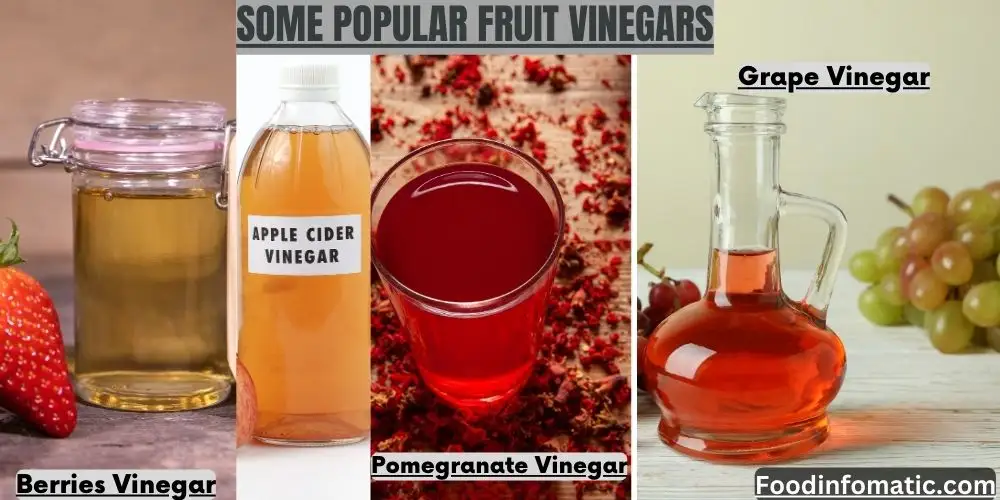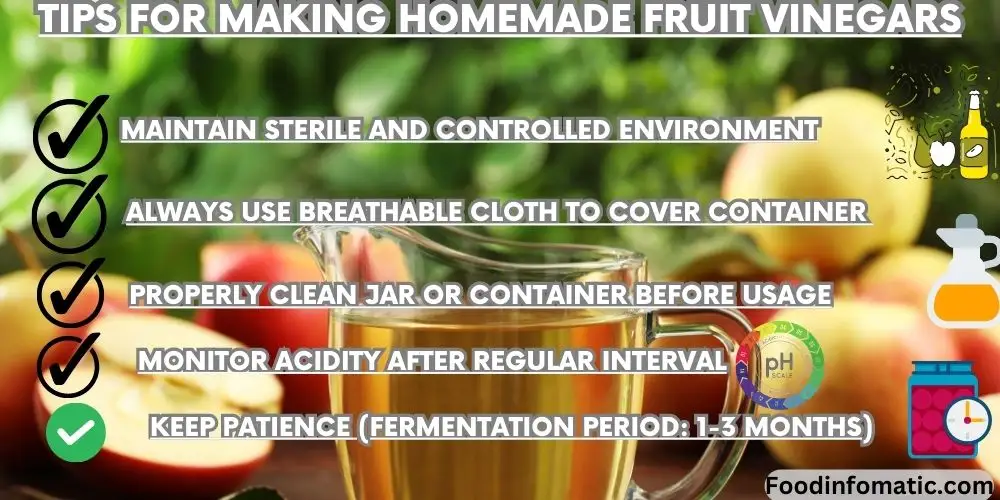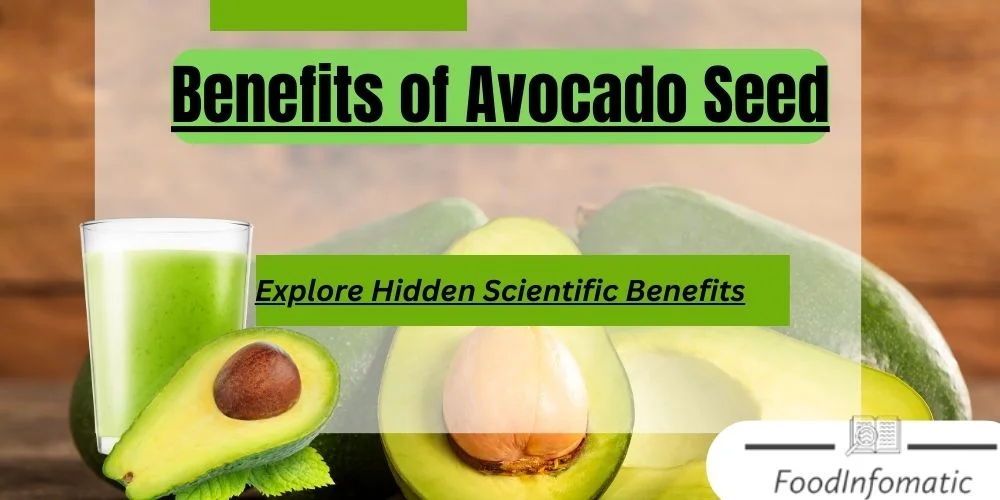Fruit vinegars have emerged as a culinary trend that offers a burst of flavours to transform ordinary recipes into extraordinary culinary creations. The various types of fruit vinegar are associated with types of fruits. Traditionally, fruit juice is used to make vinegar. This fermented fruit product has gained popularity due to its health benefits along with its acidic nature and potent flavor.
In this article, we will explore the attractive realm of fruit vinegars, exploring their versatile uses, health benefits, and amazing recipes which will bring sheer joy to your taste buds.
Let’s start with the introduction of fruit vinegar!
What is Fruit Vinegars?
Fruit vinegar is a kind of vinegar that is made with the help of fermented fruit juice. It is highly acidic in nature and has a typical aroma with a tart flavor. The intense flavor of fruit vinegars is due to the production of acetic acid during the fermentation process. The flavors of vinegars also depend on the type of fruit from which they are made (1).
Some popular fruits used to make vinegar include apples, pears, citrus, berries, mangoes, papaya, peaches, and grapes. Among them, apple cider is one of the most popular fruit vinegar.
How To Make Fruit Vinegars?
Generally, making fruit vinegar involves two different steps. In the first step, fruit juice is fermented into alcohol using yeast. In the second stage of fermentation, a type of bacteria, also known as acetic acid bacteria, is added, which converts alcohol into acetic acid, resulting in vinegar. This vinegar can be aged to develop further characteristic flavor.
Fruit vinegar can be made either from whole fruit or other scrap parts, including peel, pits, and core with fruit flesh. The purpose of using different parts is to achieve efficiency and reduce food waste.
Do you know? The history of vinegar production can be traced back to about 5000 B.C.E. Ancient civilizations like Babylonians used to ferment fruits to make vines or vinegar and utilize them as energy-boosting drinks, preservatives, cooking, and even medicines (2).
Potential Health Benefits of Fruit Vinegars
Fruit vinegars present many benefits, most of which are attributed to the production of acetic acid during the fermentation process. According to research estimates, vinegars contain 4-8% acetic acid. However, the production of fruit vinegar also ensures the presence of beneficial nutrients, polyphenols, organic acids as well as antioxidants (3).
The scientific research on individual fruit vinegars is limited, but there is significant evidence related to the health benefits of apple cider vinegars. In addition, the advantages of vinegar are also well-known. We can consider these advantages for all fruit vinegars as well.
Improve Digestive Health
Vinegars made from fruit exert a positive impact on human digestion. Acetic acid in vinegar is known to aid digestion by stimulating the production of digestive enzymes. It assists in developing a healthy gut environment. Therefore, including vinegar in your diet can help in reducing digestive discomfort and helps in promoting nutrient absorption.
Reduction In Weight, Fat and Cholesterol
Fruit vinegar contains acetate, a type of fatty acid which transforms gut hormones and plays a role in suppressing appetite (4). Vinegar also increases satiety; thus, a small amount of vinegar in your diet can help in reducing weight.
Scientific evidence also showed the potential role of apple cider vinegar in reducing fat and body weight (5).
The consumption of vinegar with meals can also enhance fatty acid utilization in the liver, thus helping against lipid accumulation. For example, research confirmed that pomegranate vinegar could exert a protective effect against lipid accumulation in the liver and improve hepatic lesions (6).
It is also known that apple cider vinegar could improve total cholesterol, especially in managing LDL (bad) cholesterol.
Fruit Vinegars Improve Blood Sugar
Consumption of vinegar can also be helpful in controlling blood sugar level. If a significant amount of vinegar is added to your diet, it can lower your blood sugar.
According to scientific research, just 10-30 mL of apple cider vinegar in a daily diet, along with carb-rich meals, can help in improving blood sugar level (7). Apple vinegar has the ability to reduce insulin resistance, and increase insulin sensitivity, ultimately lowering post-meal blood sugar spikes.
However, it should be noted that individual responses toward vinegar consumption may vary. Thus, people with severe diabetes or other medical conditions should consult with their physician or doctor before making any change in their diet plan.
People with diabetes can also avoid it and look for healthier options like fruit juices with low glycemic index.
Making Fruit Vinegar at Home
Although fruit vinegars are also available in the market, it is also easy to make at home. You would need 100% fruit juice or fruit with unchlorinated water to make vinegar. One of the easy ways is discussed below:
- Take 100% fruit juice or cold-pressed juice. You can also soak the fruit in an airtight container with unchlorinated water for 7-14 days to make a fruit infusion. This will cause the absorption of nutrients and flavor by water.
- Take fruit juice or homemade fruit infusion and add it to a food-grade container.
- Cover the container with cheesecloth. This will facilitate the natural yeasts present in the fruits to start fermenting. The activities of yeasts depend on the temperature where the container or jar is placed. They grow well in a relatively warm place (12-32 °C). Keep your juice stored for 1-3 months (3)
- Stir the mixture once a day for the first week. Then, check after 1 month to see if your vinegar is ready.
- Pour the vinegar into a bottle and start using it immediately. You can also age this vinegar for a year or more to develop more amazing flavor.
How to check if your vinegar is ready?
After fermentation, you can check the readiness of your vinegar by pouring some of it into a small sealable jar. Close the lid and seal the jar to store overnight. Open the jar the next day and see if it pops up. If yes, that means yeast fermentation activities are still continuous, and you would need to keep vinegar in the container for another week.
Storage of Fruit Vinegars
Once ready, check the acidity and skim the top part, and it can be placed at room temperature or refrigerated to store for 6-12 months.
Remember that the quality and flavor of vinegar heavily depend on proper storage.
Always keep vinegar in a sealed container and store them in a dark place away from the direct sunlight. Any exposure to sunlight, air, or heat source can affect the flavor and quality of vinegar.
Important Tips for Homemade Fruit Vinegar
There are some essential points to note if you are attempting to make vinegar at home.
- It is essential to maintain a sterile and controlled environment to enable a successful fermentation process.
- During fermentation, use a breathable cloth to cover the container or canning glass. Avoid sealing the glass as gas production may cause increased pressure resulting in the breakage of the container of glass.
- Properly clean all jars or containers and use non-reactive equipment.
- Keep patience and monitor acidity after the appropriate interval (mentioned above) during the fermentation process. It can take several weeks to months for the development of good flavor.
Top Uses and Amazing Recipes For Fruit Vinegars
The possibilities of using fruit vinegar in your daily diet can be endless and enjoyable. You can also make mixed fruit vinegar using fruits of your choice.
Although you can customize the recipes according to your needs and taste buds, here are some fantastic ways to enjoy vinegar.
- Directly consume half to one tablespoon (8-15 mL) of fruit vinegar along with your daily diet.
- Add fruit vinegar (1-2 tablespoons) to your homemade vinaigrettes or as dressing for traditional salad recipes. Salad dressing with dairy cream and a splash of fruit vinegar can be an amazing combination. If you are lactose intolerant, you can also consider some non-dairy substitutes to replace dairy cream.
- Meat or fish can also be marinated using fruit vinegar.
- Make a fantastic summer drink by mixing fresh fruit slices and a small amount of fruit vinegar with sparkling water.
- Fruit vinegar can also be added to grilled meat to enjoy an extra burst of flavor.
- Enhance the taste of sauces by adding fruit vinegars.
- Consider using fruit vinegars by pairing them in various culinary recipes to create unexpected and enjoyable combinations.
Potential Risks of Fruit Vinegar
While fruit vinegar has various culinary uses and benefits, it is important to look for potential risks as well. Firstly, the scientific evidences regarding fruit vinegars are limited. Still, some downsides should be considered before using it.
Generally, most vinegars contain about 5% acetic acid. High amount of acid affects your teeth health. According to a research study, regular and high consumption of vinegar-based foods can cause enamel erosion of teeth, resulting in the weakening of teeth (8).
Hence, high concentrations of vinegar consumption can cause negative effects on dental health.
The acid present in fruit vinegar, like apple cider, may potentially lower potassium levels in the body and even cause osteoporosis (9). Therefore, people with lower potassium levels should avoid the consumption of high quantities of vinegar without consulting a doctor or nutritionist.
Summary
Fruit vinegars are made from fermenting juice to enhance your culinary experience in a flavorful and creative way. They can be used in various recipes, like salad dressing, marinades, desserts, daily meals, etc. This worldwide popular fermented product offers numerous health benefits, including weight loss and improved digestion and blood sugar level. If consumed in moderation, it is likely that fruit vinegar will not cause any harmful effects.
However, if you are facing some health complications, it is recommended to consult with your physician.






